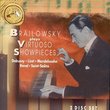| All Artists: Sibelius, Davis, London Symphony Orchestra Title: Symphonies 1 & 4 Members Wishing: 0 Total Copies: 0 Label: RCA Release Date: 11/12/1996 Genre: Classical Styles: Historical Periods, Modern, 20th, & 21st Century, Symphonies Number of Discs: 1 SwapaCD Credits: 1 UPC: 090266818327 |
Search - Sibelius, Davis, London Symphony Orchestra :: Symphonies 1 & 4
 | Sibelius, Davis, London Symphony Orchestra Symphonies 1 & 4 Genre: Classical
|
Larger Image |
CD DetailsSimilar CDs
|
CD ReviewsSibelius, gently. Made my ears smile. K. Swanson | Austin, TX United States | 05/06/2008 (4 out of 5 stars) "Just heard this for the first time, very beautiful versions of both symphonies, well-recorded and not very digital-sounding, made my ears smile in many ways. I've always thought Sibelius was perhaps the most cinematic of classical composers, and Davis brings that sense of lush drama to the fore. The orchestra is refined and relaxed and all in all this is a gorgeous listening experience, particularly the First. I like the way Davis stays out of Sibelius' way rather than forcing his interpretation too strongly on the music, as VK and others sometimes do. Speaking of movie music, I had forgotten how completely Rota ripped off the lead theme in Symphony 1 for the Godfather. Note for note until Ennio resolves it differently, such a blatant robbery. If movie composers like Williams, Steiner, etc had to pay roylaties to all the great composers they steal from, they'd be broke! " Comparative Reviews v. Berglund and Maazel in #4 Karl W. Nehring | Ostrander, OH USA | 08/08/2009 (4 out of 5 stars) "Davis v. Berglund: The more I listened to these two CDs, the more I found myself wishing that I had picked a couple of other recordings to compare. The plain truth is that I honestly like both versions too much to find fault with either, and they are both recordings that I recommend highly. Both recordings were engineered by Tony Faulkner, who always does a superb job. To make a meaningful recommendation even more difficult to pass along, each CD has a different pairing, and both of the pairings are outstanding. The real problem here is that unlike other pairs of recordings I have compared (e.g., Boulez versus Abbado in the Mahler Fifth and Chailly versus Boulez in Ravel's Daphnis et Chloe), these two versions do not really compete with each other. They are complementary to each other, and complimentary to the music.
Davis's version with the London orchestra is slower and a bit warmer than Berglund's, which is hardly surprising given that Davis is leading an orchestra of about a hundred players, while Berglund's orchestra is about half that size. At times I prefer the lush approach of Davis, but there is much to be said for the clarity of Berglund. But that is not to say that Davis's reading is not clear, for it is, with very precise playing; nor is it to say that the version by Berglund is coldly analytical, which it is not--it is a very affectionate and involved reading of this enigmatic but beautiful music. Were I recommending these CDs for someone coming to this music for the first time, I would lean toward Davis, on the grounds that his more conventional approach is the best way to hear a new work, and because the companion piece on this disk, the First Symphony, is more likely to appeal to the Sibelius neophyte than the more enigmatic Sixth. However, to the seasoned music lover who is already familiar with the Sibelius Fourth, I would probably recommend Berglund, on the grounds that his use of a smaller orchestra leads to a rendition of the score that sheds new light on this piece, and because the Sixth Symphony is such an interesting piece of music, and probably less to most listeners familiar than the oft-recorded First. I hate to sound as if I am copping out, but all I can say is that here are two excellent versions of this superlative symphony, both well recorded by the same engineer, and both worth owning by anyone who loves this work. If I absolutely must recommend one over the other, I would recommend the Berglund, because with its chamber orchestra forces, it offers a different but valid approach to the score. Davis v. Maazel: I really looked forward to comparing the Davis performance, which I really like, to Maazel's performance. I can't quite recall with certainty whether I once owned an LP of the Maazel (I think I did, but can't swear to it), but I do know with certainty that I have a cassette version tucked away in a corner somewhere. In any event, I was tickled to see that the Maazel is now available in a remastered CD version. Because it had not been long since I listened intently to the Davis disk, I figured that I had the music pretty well imprinted in my mind when I first ventured to listen to the Maazel disk. Unusually, this first listen was through headphones. The first time I saw this disk was at a store where they feature displays with new releases, and the Maazel Sibelius happened to be on display, so I gave it a listen. Through the inexpensive display headphones, the first note nearly made me jump, as the Vienna musicians tore into it as though their lives depended on it. Wow! I listened briefly, then hung up the phones and went back to browsing through the racks. But the music had been imprinted in my brain. What a downbeat! This sounded far different from the Davis version, and my curiosity was aroused. On my home system, it is still a most impressive downbeat, a downbeat for the ages, a miracle! The Vienna musicians bow that note with savage force, but with perfect control. It makes you snap to attention as the symphony then shifts to its more mysterious mode. You have been jolted into wanting to hear what is going to come next. Very effective conducting, very impressive playing... Or is it more a case of very clever (or at least very different) engineering? When I switched to the Davis account, which has been my reference version for a while, I was truly taken aback to hear how soft that opening note seemed. But then I realized that there were a couple of engineering differences that accounted for a good portion of the musical difference. First, the Decca team seems to have used more microphones, and placed them closer to the instruments. Second, the Decca is mastered at a MUCH higher level than the RCA. I cannot recall doing a comparison where there was such a pronounced difference in level between two recordings of the same work. The difference is at least seven or eight decibels, and the perceived volume difference in some passages was compounded by the difference in sonic perspective. These differences made it virtually impossible to compare the two recordings by switching quickly back and forth between them. It should be apparent to most that what we have here are two very different views of this composition, and two very different views of how an orchestra should be recorded. Playing the two recordings, I was struck that the Decca recording and performance seemed to illuminate the work with bright, direct light, emphasizing contrasts and colors and bringing out the stronger emotions associated with this enigmatic music (e.g., feelings of mystery and fear), while the RCA recording and performance seemed to be given in a hall in the evening, with mysterious sounds emerging from the darkness. Both performances are virtuosic and sharp, each in its own way. Maazel takes the third movement much more quickly than Davis; the two approaches both work, each in a different way. What we have here, then, are two very different but very effective recordings of this magnificent symphony. The Decca recording lets you hear the work as a conductor would hear it, from the podium, while the RCA recording puts you in a good seat in the hall. Maazel's account is charged with energy, and can be nearly overwhelming, while the Davis account is subtler, but very beguiling in its own way. I have listened to and owned many recordings of this work over the years; these two are at the top of my list of favorites. For the first-time listener, I would recommend the Davis first, because it is the more conventional view of the work, and the recording is so natural sounding. For the person who is familiar with this work, I would strongly recommend the Maazel, because it is such an overwhelmingly exciting interpretation and recording. If you factor in the couplings, the choice is still difficult. Although I love the Seventh Symphony and Tapiola on the Maazel disc, the Maazel versions of these works would not be my first choice (the Osmo Vänskä disk on BIS with the last two symphonies plus Tapiola would be my first recommendation, supplemented by Segerstam's slow but powerful Tapiola on Chandos), while the First Symphony performance on the Davis disk is really gorgeous (oh, those lovely clarinets!), one of the best I have ever heard. When you really come down to it, then, I recommend both of these disks quite highly, and would urge those readers with an appreciation for the music of Sibelius to track them both down. These are two very different, very wonderful recordings of a great masterpiece of music." |

 Track Listings (8) - Disc #1
Track Listings (8) - Disc #1